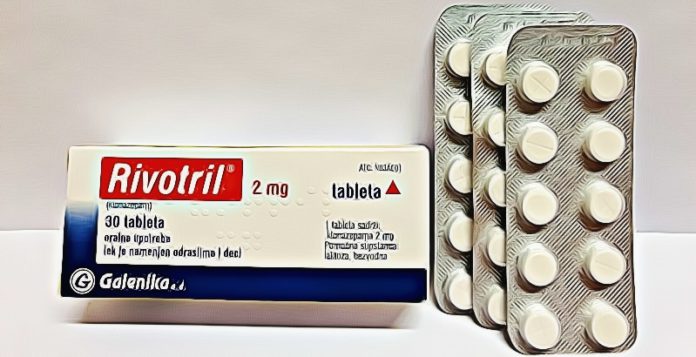Many people who struggle with the perils of addiction and seek recovery are given a prescription to a variety of medications that help them function better. Since addiction treatment deals with the multifaceted elements of the disease such as behavior, cognitive chemistry imbalances, cravings, and health issues, medications help the balance. Various pharmaceuticals are available to treat addiction and their respective mental illnesses people get over years of use.
One medication that is used for addiction treatment is known as Rivotril, a benzodiazepine that was made to assist epileptic people to have reduced instances of seizure disorders. It’s also known as Klonopin, which is essentially the same substance that’s branded differently. Both Klonopin and Rivotril fall under the name clonazepam, and here’s more about this medication if you’ve been given a prescription by your doctor:
What Is Rivotril?
As mentioned above, Rivotril is known generically as clonazepam. Since it’s classified as a benzodiazepine, it also assists with anxiety disorders and is under the list of controlled substances because of the risk of abuse. It’s often used for short-term applications and isn’t a cure-all pill due to the ease of increased resistance to the drug. It takes effect almost instantly by increasing gamma-aminobutyric acid production, known as GABA. This GABA production solves the deficiency that causes plenty of panic attacks and seizures, reducing their occurrences altogether.
The overall sensation you get from clonazepam is sedation, which is common for all benzodiazepines. They are meant to reduce the effects of panic attacks and anxiety disorders, which help people function better. Those who suffer from addiction often receive these medications to help with restoring functionality without the use of illegal substances. Since alcohol and other drugs are downers and can often trigger anxiety disorders and depressive episodes, Rivotril can assist with overall recovery. Negative sensations are often relapse triggers, which put a person’s recovery at risk of losing all progress. Medications act as the balancer and often help with restoring the right brain function through improved chemistry levels.
Rivotril’s Effects
Since Rivotril is a sedative, you’ll likely receive impaired coordination as a result of taking it. This impaired state means that you should not drive or operate heavy machinery because of the risks of memory lapses and falling asleep. Other people report feeling dizzy and drowsy, with some instances of blurred vision and delayed or slurred speech. Concentration is also difficult because of the sedative effects on the brain. These are common sensations related to the use of clonazepam, but there are also some side effects people feel when they start the medication.
Possible side effects can increase a person’s heart rate, cause shortness of breath, increase the incidence of headaches, and cause abdominal cramping. Additionally, people may experience irregular bowel movements, constipation, excessive urination, and impotence with reduced sex drive. These side effects are typically not normal and will require you to visit your doctor to ensure that Rivotril isn’t reacting negatively to your body.
One thing that a select few users may experience is allergic reactions to the drug. If your skin develops hives or itches and you feel your face and extremities swell up, or your throat closes up causing the inability to breathe, seek medical attention instantly. It’s common for people to be allergic to various pharmaceuticals, so be sure you monitor the reactivity of your prescribed medications before you take them regularly.

Addiction to Rivotril
Rivotril is meant to be utilized for only a short period of time to regularize sleeping patterns and act as an anti-anxiety medication. Once you’ve started taking it regularly, you’ve practically become dependent on it and can make stopping its consumption dangerous. Using it for a period of time and trying to cut it out of your system via a “cold turkey” method can cause severe feelings of withdrawal in people. Some users report irritability, dizziness, increased heart rates, nausea, and other extreme occurrences like seizures. Others who are highly-dependent on pharmaceuticals like benzodiazepines can experience hallucinations, psychosis, and even trigger severe behavioral problems and disorders.
Using greater doses and extending the period of use is deadly because of the development of withdrawal symptoms. Never stop taking any clonazepam brand, whether it’s Rivotril or Klonopin without consulting your physician first about the effects. In most cases, these have to be subtly removed from your system to avoid harmful withdrawals. Your doctor may gradually reduce the dosage to ensure that you don’t shock your system with an abrupt change in substance use.
Withdrawal Effects of Rivotril
Withdrawals can happen to anyone who develops a chemical dependency on Rivotril, similar to other drugs and pharmaceuticals. Since medications for mental health and other cognitive disorders are often potent, changing them abruptly often ends negatively. The initial symptoms can come in the form of irritability and nervousness due to trouble sleeping. Since Rivotril is a sedative, once it doesn’t have the same effect because of abuse or excessive consumption, it can often be detrimental to a person’s health.
If you’ve been dealing with reduced effects of the medication, it’s best to consult with a doctor regarding what changes to make and if the dosage needs to be adjusted. Many people may start to experience the symptoms listed above in previous paragraphs, with common ones being bodily pains, dizziness, drowsiness, and a wired feeling. More severe withdrawal symptoms can be hallucinations, depression, paranoia, and rapid heartbeats.
How Do You Know If You’ve Overdosed on Rivotril?
If you’ve taken more than the recommended dosage as posted by your doctor, this is already a risk of overdose because Rivotril is an extremely potent substance. If you’re feeling extreme pains in your abdomen, starting to sweat profusely, becoming nauseated followed by vomiting, and having paranoia and hallucinations, seek medical help instantly. Leaving the effects of overdosing on Rivotril in your body is deadly and can cause fatalities. Once the withdrawal symptoms evolve into difficulties in breathing, an irregular pulse, different levels of sedation, and starting to lose coordination, this is serious and can lead to a coma.
Why You Shouldn’t Mix Rivotril With Alcohol or Other Drugs
Alcoholics often are prescribed Rivotril because alcohol is a downer that often causes depression and anxieties in the more severe stages. Since this beverage is a sedative, the sedative nature of Rivotril can cause adverse reactions and effects. Often, alcohol makes mental health conditions worse and counters the effects of the medications. If you drink too much and take Rivotril pills at the same time, this increases the risk of overdosing.
Additionally, staying away from other drugs like opioids and other stimulating substances can cause adverse reactions to Rivotril and can cause the user to go into a state of comatose. These pharmaceuticals are not meant to be mixed with other substances, even other herb and vitamin supplements that claim to be safe. If you’re unsure about your abilities to stop drinking or using drugs, seek addiction treatment or the assistance of a physician to ensure that the medications can be adjusted alongside treatment.
Conclusion
Rivotril is a benzodiazepine that’s meant to be used for short-term treatment programs and never as a cure-all pharmaceutical. If you’re unsure about the use and are experiencing harsh side effects to the medications being given to you, contact your doctor right away because of the risk of overdosing and severe withdrawals.
Sources:
















